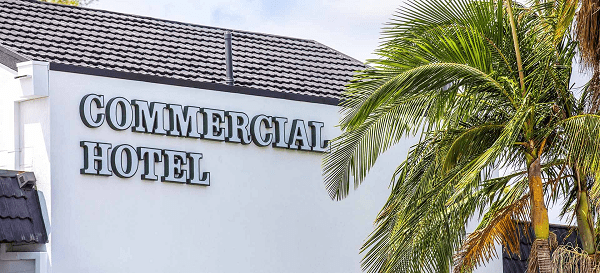Commercial‐hotels- Commercial hotels are a type of lodging establishment that caters primarily to business and leisure travelers. These hotels are typically privately owned or part of hotel chains and are operated with the goal of generating revenue. Here are some key characteristics and features of commercial hotels:
- Wide Range of Services: Commercial hotels offer a wide range of services and amenities to accommodate the needs and preferences of their guests. This can include room service, restaurants, bars, fitness centers, business centers, and more.
- Variety of Room Types: They usually offer various types of rooms, from standard rooms to suites, to cater to different budgets and requirements.
- Location: Commercial hotels are often strategically located in urban areas, near airports, business districts, tourist attractions, or convention centers to attract both business and leisure travelers.
- Meeting and Event Facilities: Many commercial hotels have meeting rooms and event spaces for conferences, seminars, weddings, and other gatherings.
- Branding and Chains: Some commercial hotels are part of larger hotel chains, which may include well-known brands like Hilton, Marriott, or Holiday Inn. These chains often have consistent quality standards and loyalty programs for frequent guests.
- Online Booking: They typically have an online presence, allowing guests to book rooms through their websites or third-party booking platforms.
- Professional Staff: Commercial hotels employ a professional staff, including front desk agents, housekeeping, maintenance, and management, to ensure a high level of customer service.
- Pricing: Prices for rooms can vary widely depending on factors such as location, season, room type, and the hotel’s star rating or reputation.
- Amenities: Commercial hotels may offer amenities like swimming pools, spas, concierge services, and complimentary breakfast.
- Security: Security is usually a priority, with measures such as key card access, surveillance cameras, and 24-hour front desk service.
- Housekeeping: Regular housekeeping services are provided to maintain cleanliness and comfort for guests.
- Food and Beverage: Many commercial hotels have on-site restaurants and bars, providing dining options for guests who prefer to eat within the hotel.
- Loyalty Programs: Some commercial hotel chains offer loyalty programs that reward frequent guests with points or perks for their stays.
Commercial hotels play a significant role in the hospitality industry and cater to a diverse clientele. They aim to provide a comfortable and convenient stay for travelers, whether they are on business trips, family vacations, or other types of journeys.
What is Commercial‐hotels
The term “Commercial-hotels” doesn’t appear to represent a specific category or type of hotels within the hospitality industry as of my last knowledge update in September 2021. It’s possible that this term refers to hotels that primarily serve commercial or business travelers, but it’s not a widely recognized classification in the hospitality industry.
If you have a more specific question or if there’s a particular aspect of commercial hotels or the hospitality industry you’d like to know more about, please provide additional context, and I’ll do my best to assist you.
Types of Commercial‐hotels

Commercial hotels encompass a wide range of types and categories that cater to various types of travelers and needs. Here are some common types of commercial hotels:
- Full-Service Hotels: These hotels offer a broad range of amenities and services, including restaurants, bars, room service, fitness centers, meeting and event facilities, and more. They are often found in city centers and tourist destinations.
- Business Hotels: These hotels are tailored to meet the needs of business travelers. They typically provide amenities such as business centers, conference rooms, high-speed internet, and proximity to business districts.
- Luxury Hotels: Luxury or high-end hotels offer top-notch amenities, personalized services, and premium accommodations. They often feature fine dining restaurants, spas, and other upscale facilities.
- Boutique Hotels: Boutique hotels are characterized by their unique, often themed, and intimate atmosphere. They focus on providing a distinctive and personalized guest experience.
- Resort Hotels: Located in scenic destinations, resort hotels offer recreational amenities like swimming pools, golf courses, spas, and activities for leisure travelers. They may be near beaches, mountains, or other natural attractions.
- Airport Hotels: These hotels are situated near airports and cater to travelers who need convenient access to flights. They often provide shuttle services and facilities for quick stopovers.
- Extended-Stay Hotels: These are designed for guests who need accommodations for longer periods, such as business travelers on extended assignments or individuals relocating. They offer kitchenettes or fully equipped kitchens.
- Budget Hotels: Budget or economy hotels provide basic accommodations at affordable prices. They are suitable for travelers looking for cost-effective lodging options.
- Select-Service Hotels: These hotels offer a limited set of amenities and services compared to full-service hotels but provide comfortable accommodations at lower rates.
- Bed and Breakfasts (B&Bs): B&Bs are smaller lodging establishments that typically offer a homey atmosphere with breakfast included in the room rate. They are often independently owned.
- Hostels: Primarily catering to budget-conscious travelers, hostels provide dormitory-style accommodations with shared facilities, making them popular among backpackers and young travelers.
- Casino Hotels: Located in areas with legalized gambling, these hotels often feature attached casinos, as well as restaurants, entertainment, and other amenities.
- Motel: Motels are typically roadside lodgings designed for travelers on the go. They often have parking right outside rooms for easy access.
- Historic Hotels: These hotels are often housed in historic buildings and offer a glimpse into the past with period décor and architecture. They aim to preserve historical elements while providing modern amenities.
- Conference Centers: Conference center hotels are equipped with extensive meeting and event facilities, making them ideal for conventions, conferences, and large gatherings.
These are some of the common types of commercial hotels. Each type caters to specific demographics and preferences, providing a range of options for travelers worldwide.
What I will learn with Commercial‐hotels
Learning about commercial hotels can provide you with valuable knowledge about the hospitality industry, customer service, and various aspects of hotel management. Here’s what you can expect to learn when studying or gaining experience in the field of commercial hotels:
- Hospitality Industry Overview: You will gain an understanding of the hospitality industry, including its size, scope, and global reach.
- Types of Hotels: Learn about the different types of hotels within the commercial sector, as mentioned in the previous response, and their unique characteristics.
- Hotel Operations: Understand the day-to-day operations of a hotel, including front desk procedures, housekeeping, maintenance, and food and beverage services.
- Customer Service: Develop skills in providing exceptional customer service, handling guest inquiries and complaints, and ensuring guest satisfaction.
- Hotel Management: Learn about the roles and responsibilities of hotel management, including general managers, department heads, and staff coordination.
- Hospitality Trends: Stay updated on industry trends and innovations, such as technology integration, sustainability initiatives, and changing guest preferences.
- Marketing and Sales: Explore hotel marketing strategies, revenue management, and sales techniques to attract guests and maximize revenue.
- Hospitality Finance: Understand the financial aspects of hotel management, including budgeting, pricing strategies, and cost control.
- Food and Beverage Management: If applicable, learn about restaurant and bar management within the hotel, including menu planning, food safety, and beverage service.
- Hospitality Ethics and Legal Considerations: Explore ethical issues in the industry, as well as legal requirements related to hotel operations, guest safety, and employment practices.
- Guest Experience: Discover ways to enhance the overall guest experience, from check-in to check-out, and how it impacts a hotel’s reputation.
- Hospitality Technology: Gain knowledge of the technology used in hotels, including property management systems, online booking platforms, and guest communication tools.
- Hotel Design and Layout: Understand the design principles that contribute to a hotel’s functionality, aesthetics, and guest comfort.
- Sustainability and Environmental Practices: Learn about sustainability practices and eco-friendly initiatives that many hotels are adopting to reduce their environmental impact.
- Crisis Management: Develop skills in handling emergency situations and crisis management, ensuring the safety and well-being of guests and staff.
- Teamwork and Leadership: Build leadership skills and learn how to manage and motivate a diverse team of hotel employees.
- Customer Relationship Management: Understand the importance of building long-term relationships with guests and creating loyal customers.
- Cultural Sensitivity: Develop cultural awareness and sensitivity to serve a diverse range of guests from around the world.
Overall, studying or working in commercial hotels can provide you with a versatile skill set that can be applied in various roles within the hospitality industry and related fields, such as tourism, event management, and restaurant management. It offers a dynamic and rewarding career path for those interested in providing excellent service to guests and managing hotel operations effectively.
Case Study on Commercial‐hotels
“Riverview Hotel”
Background: Riverview Hotel is a mid-sized commercial hotel located in a picturesque tourist destination known for its natural beauty and outdoor activities. The hotel has 150 rooms, a full-service restaurant, a bar, a fitness center, and meeting facilities. While it enjoys a prime location with a river view, it has been facing several challenges.
Challenges:
- Seasonal Variability: The hotel experiences significant seasonal fluctuations in occupancy rates. Summers are busy with tourists, while the winter months see a sharp decline in bookings.
- Online Competition: The rise of online booking platforms has led to increased competition. Riverview Hotel needs to find ways to stand out among the many options available to travelers.
- Aging Infrastructure: The hotel’s facilities are beginning to show signs of wear and tear, and some guests have raised concerns about maintenance issues.
- Staff Turnover: High staff turnover is affecting the quality of service. Frequent training is required for new employees, leading to inconsistencies in guest experiences.
- Environmental Concerns: Guests are increasingly concerned about the hotel’s environmental impact, including waste management and energy consumption.
Solutions:
- Diversification of Revenue Streams: To address seasonal variability, Riverview Hotel can diversify its offerings. For example, it can host special events, offer holiday packages, and target business travelers during the off-season by marketing meeting and conference facilities.
- Online Marketing and Reputation Management: Invest in online marketing, social media presence, and online reputation management. Encourage satisfied guests to leave positive reviews on travel review websites.
- Renovation and Maintenance: Allocate a budget for renovating and maintaining the property. Upgrading rooms, public spaces, and amenities can improve guest satisfaction and extend the life of the facilities.
- Employee Retention and Training: Implement employee retention programs, competitive salaries, and ongoing training and development to reduce staff turnover and ensure consistent service quality.
- Sustainability Initiatives: Introduce sustainability practices such as recycling programs, energy-efficient lighting, and water-saving measures. Highlight these initiatives to attract environmentally conscious travelers.
Results:
By implementing these solutions, Riverview Hotel can expect several positive outcomes:
- Improved Year-round Occupancy: Diversifying revenue streams can help the hotel maintain more consistent occupancy rates throughout the year.
- Enhanced Reputation: Effective online marketing and reputation management can lead to higher rankings on travel websites, attracting more guests and increasing repeat bookings.
- Increased Guest Satisfaction: Renovations and maintenance efforts can result in improved guest satisfaction scores and positive word-of-mouth recommendations.
- Stable Workforce: Employee retention programs can lead to a more stable and motivated workforce, which in turn can lead to better service and guest experiences.
- Sustainability Recognition: By adopting sustainability initiatives, the hotel can attract eco-conscious travelers and demonstrate its commitment to environmental responsibility.
In conclusion, the case study of Riverview Hotel highlights some common challenges faced by commercial hotels and suggests strategies to address them. By implementing these solutions, the hotel can enhance its performance, profitability, and reputation in the competitive hospitality industry.
White paper on Commercial‐hotels
Title: Maximizing Success in Commercial Hotels: Strategies and Insights
Abstract: This white paper delves into the multifaceted world of commercial hotels, offering a comprehensive overview, key challenges, and effective strategies to thrive in this dynamic industry.
Table of Contents:
- Introduction
- Definition and Scope of Commercial Hotels
- Importance of the Hospitality Industry
- Types of Commercial Hotels
- Overview of Various Hotel Categories
- Differentiation in Services and Amenities
- Industry Trends and Challenges
- Key Trends Shaping the Hotel Industry
- Common Challenges Faced by Commercial Hotels
- Maximizing Occupancy Rates
- Strategies for Managing Seasonal Variability
- Targeting Diverse Guest Segments
- Effective Marketing and Branding
- Building a Strong Hotel Brand
- Leveraging Digital Marketing and Online Booking Platforms
- Guest Experience and Service Quality
- Enhancing Guest Satisfaction
- Importance of Customer Relationship Management
- Hotel Operations and Management
- Streamlining Daily Operations
- Staff Training and Retention
- Sustainability and Environmental Responsibility
- Eco-Friendly Practices in Hotels
- Meeting Guest Demand for Sustainable Options
- Financial Management and Revenue Optimization
- Pricing Strategies and Revenue Management
- Budgeting and Cost Control
- Technology Integration
- Role of Technology in Hotel Operations
- Trends in Hotel Technology
- Investing in Infrastructure and Renovation
- The Importance of Property Maintenance
- Renovation Strategies for Long-Term Success
- Case Studies
- Real-world examples of successful commercial hotels and their strategies.
- Conclusion
- Summary of Key Takeaways
- Future Outlook for the Commercial Hotel Industry
- References
- Cite relevant research, reports, and sources.
Key Points and Insights:
- Commercial hotels cater to both business and leisure travelers and come in various categories, from luxury resorts to budget accommodations.
- Key industry trends include the rise of online booking platforms, sustainability initiatives, and the importance of online reputation management.
- Strategies for success involve diversifying revenue streams, investing in guest experience, employee retention, and embracing sustainability.
- Effective marketing and branding can help hotels differentiate themselves and attract their target audience.
- Managing occupancy rates, particularly during seasonal fluctuations, is crucial for consistent revenue.
- Sustainability practices not only reduce environmental impact but also appeal to eco-conscious travelers.
- Technology plays a pivotal role in improving operational efficiency and enhancing the guest experience.
- Financial management, budgeting, and cost control are essential for profitability.
- Renovations and infrastructure maintenance are investments that contribute to a hotel’s long-term success.
Creating a detailed white paper on commercial hotels would require extensive research, data analysis, and a comprehensive review of industry best practices. This outline provides a structure to begin exploring and discussing the various facets of the commercial hotel industry in-depth.





